Gratuitous Excess: Baz Luhrmann's 'The Great Gatsby'
"Gatsby? What Gatsby?" -everyone pretending they didn't see the movie.
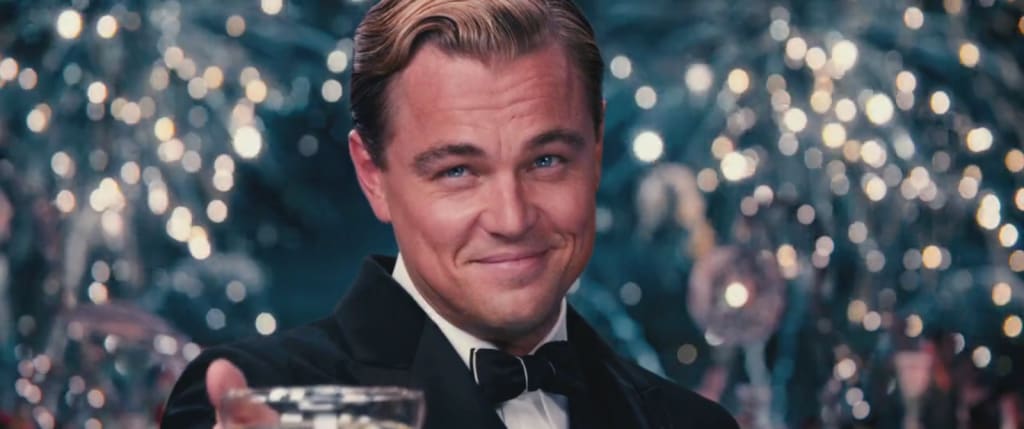
The greatest novel of the American dream (in my opinion) is F. Scott Fitzgerald's The Great Gatsby. It's sad and sweet and gets read once a year as I sit on the shores of Long Island, beach chair in tow and getting roasted by the sun just to find out if it doesn't end the same way. (Spoiler--Gatsby still dies. I'd apologize for that, but if you haven't read it by now, shame on you).
The story of time and working for something is evergreen, and as someone experiencing the joie de vivre that is New York more now than ever, I can see how Fitzgerald saw New York, and everything it has to offer. A couple film adaptations were made, one with Robert Redford, Sam Waterson, and Mia Farrow, and the other with Paul Rudd as a dry Nick Carraway. Neither were exceptional, yet, neither were awful.
Enter Baz Luhrmann. He was the latest director to take on the challenge of bringing the American classic to the silver screen. His interpretation of F. Scott Fitzgerald’s novel The Great Gatsby turns a few swanky parties in the midst of wealthy Long Island towns into a scene of chaos.
His version of the story is told in an interesting fashion. And sometimes I wonder how good the movie really would have been if there was never such a beautiful piece of literature as its source material. Hmm...
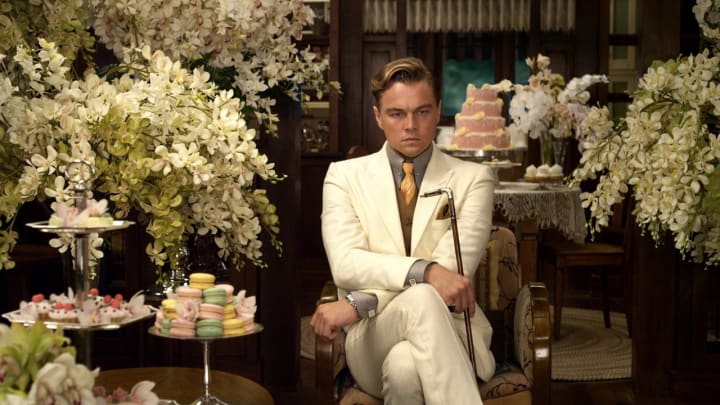
Courtesy of Warner Bros. Pictures
The film is a flashback for Nick Caraway (Tobey Maguire). He sits in a sanatorium, reflecting on his summer in 1922 where he rented a cottage in West Egg. His neighbor, the notorious Jay Gatsby (Leonardo DiCaprio), was known for throwing parties and not showing up to them. After attending one of them out of sheer curiosity, Caraway gets thrown into the world of chaotic excess and the secret-keeper to a timeless love affair. Caraway weaves together a memoir of his months there, with Gatsby’s elusive nature as his focal point.
Leonardo DiCaprio plays an awkward Jay Gatsby. He is the ideal pretty-boy Gatsby, who attempts to keep his cool and plays down his wealth even though it’s impossible to ignore. I couldn’t help but laugh at how socially incompetent he was out and about, yet somehow was able to brim with confidence with his “reassuring smile.” Juxtaposing him with Maguire as his only friend was a good choice on the director’s part. Casting overall wasn’t too bad. Carey Mulligan plays the airy Daisy Buchanan, a young woman torn between Gatsby and her husband, Tom (Joel Edgerton). The cast, however seemed as drawn out as Caraway did in the sanatorium at some points. The passion is subtle, which doesn’t represent the beautiful words of Fitzgerald.
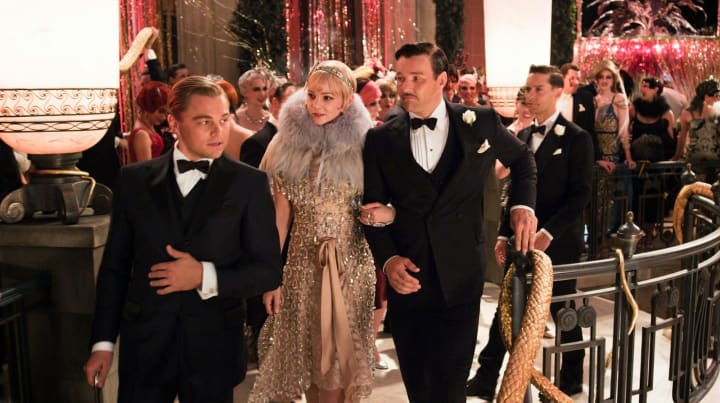
Courtesy of Warner Bros. Pictures
As every director has their own artistic licensing to put into a film, Luhrmann left out some things. First, Jordan Baker (played by Elizabeth Debecki-Caraway’s love interest) didn’t play as big as a role in the film as she did in the book. Luhrmann also fails to show their relationship as well. Daisy Buchanan also was blonde in the film, as she is a brunette in the novel (actually, it may never be mentioned, but either way she is interpreted as such. Hmmmm...)
Second, when we meet Jay Gatsby, the book depicts it as an anti-climactic moment, as Caraway stumbles upon him by happenstance at one of his parties. Here, we met Jay Gatsby at one of the final crescendos of “Rhapsody in Blue,” as confetti flew through the air, fireworks boomed and he raised his glass in triumph. Fitzgerald made it seem like anyone could be Gatsby with how he introduces him. Lurhmann glorifies Gatsby as soon as he takes over the silver screen. He matches the rumors and build-up we see with an immense grandeur, as oppose to in the novel. Gatsby subtly slips into the crowd to meet Caraway, highlighting the elusiveness of his character as oppose to turning him into the big deal he really isn’t.
The film ended with Gatsby’s death and left out a good portion of the last chapter of Fitzgerald’s book. Once Gatsby dies, so does the film. We see no after-math for Caraway as his summer ends.
We still get those iconic final lines of the novel though, thank God.
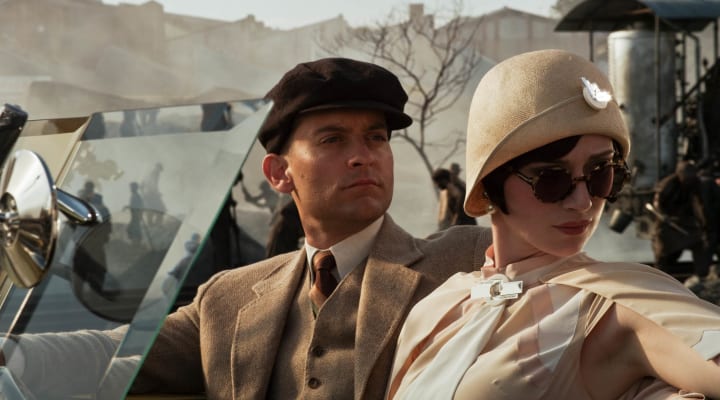
Courtesy of Warner Bro. Pictures
As Gatsby tells Caraway about his life whilst driving in his yellow convertible, he speeds and races his way from West Egg to New York. This was effective cinematographically speaking, as Gatsby’s life takes twists and turns unexpectedly, from his younger days up to what we see before us.
The boisterous party scenes in Gatsby did a fine job of showing all the spending the wealthy would do during the Roaring Twenties. Here, the excessive suddenly becomes too excessive. The parties Gatsby threw in this interpretation became almost too much. They seem exaggeratory, even for one of the wealthiest men on Long Island.
The scenes unfolded, showing a world beyond my wildest dreams. They were pretty satisfactory, and indeed a valiant effort to make up for what was missing from to book. Butlers were fishing martini glasses out from the pool, women were dressed to the nines doing the Charleston, and confetti flew in the air like a rainstorm. What a few opulent 1920’s parties should be are turned into endless nights of chaos. But then again, Gatsby led a life that was anything but mundane.
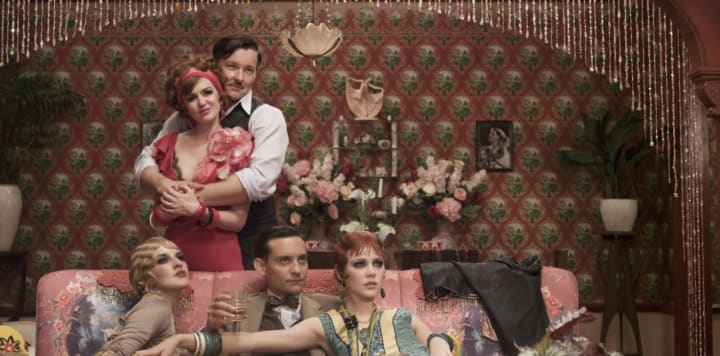
Overall, I applaud Luhrmann for his interpretation. It was a bold move, mixing in so many anachronistic aspects such as his soundtrack. I wasn’t surprised, as Jay-Z was the executive producer of the film. Caraway says in the film “you can’t change the past.” However, Luhrmann tries to with the rap music and excessive beats. I may be no historian, but I am pretty sure that big band jazz was the thing in the 1920’s. Some jazzy tunes had been slipped into the film, including Cole Porter’s “Let’s Misbehave" and Gershwin’s “Rhapsody in Blue,” which fit the era perfectly. As far as Jay Z’s music choices go, they just don’t fit in.
The underlying theme of the 1920’s excessive nature consumes the film overall. It is pretty effective, but it becomes a distraction. Even though with an obscenely flexible budget making the opulent jazzy parties come alive from Fitzgerald’s pages was accomplished in such a flashy way, it takes away from what Fitzgerald really wrote. The Great Gatsby is the quintessential American Dream novel, and all the glamour and glitz in this modernistic interpretation takes away from what it is meant to be-a tale of hope, passion and repeating past.
After my revisiting, I still think it's a disasterpiece worth watching once, especially if you've read the book and haven't seen it.
About the Creator
Marina Caitlin Watts
Marina loves Frank Sinatra and hates decaf coffee. The native New Yorker and Cornell grad knows every word to "Ferris Bueller's Day Off" and thinks Shakespeare is cool. If you need her, she's waiting for Godot. Twitter: @marina_caitlin




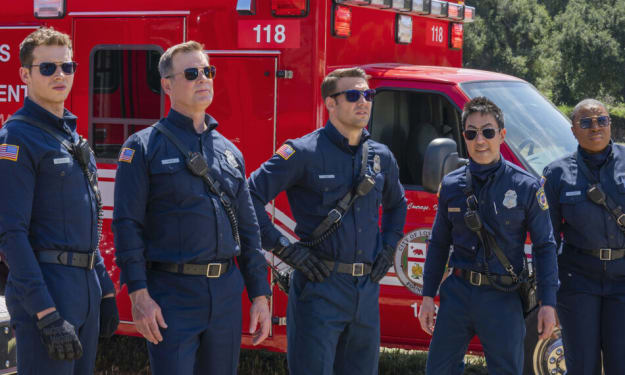

Comments
There are no comments for this story
Be the first to respond and start the conversation.